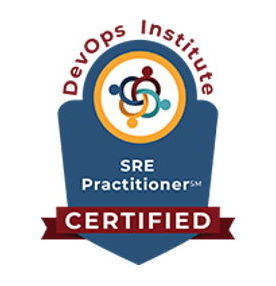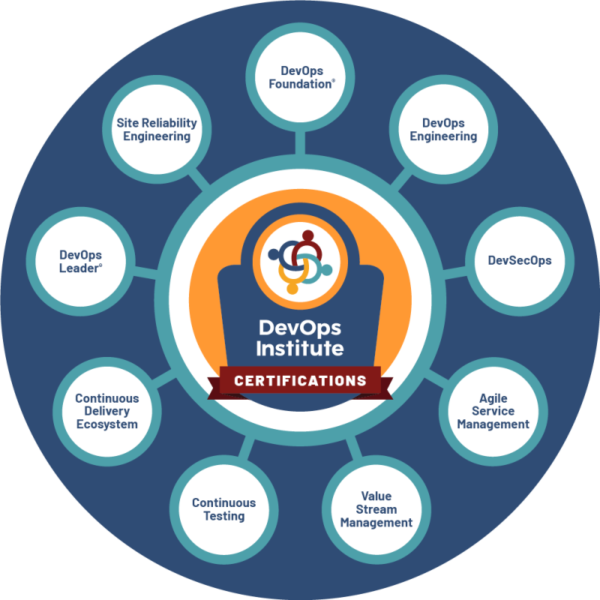30 Jul Site Reliability Engineering (SRE) Practitioner ℠

Site Reliability Engineering (SRE) Practitioner ℠
INTRODUCTION
The SRE (Site Reliability Engineering) Practitioner course introduces ways to economically and reliably scale services in an organization. It explores strategies to improve agility, cross-functional collaboration, and transparency of health of services towards building resiliency by design, automation and closed loop remediations.
The course aims to equip participants with the practices, methods, and tools to engage people across the organization involved in reliability through the use of real-life scenarios and case stories. Upon completion of the course, participants will have tangible takeaways to leverage when back in the office such as implementing SRE models that fit their organizational context, building advanced observability in distributed systems, building resiliency by design and effective incident responses using SRE practices.
The course is developed by leveraging key SRE sources, engaging with thought-leaders in the SRE space and working with organizations embracing SRE to extract real-life best practices and has been designed to teach the key principles & practices necessary for starting SRE adoption.
This course positions learners to successfully complete the SRE Practitioner certification exam.
COURSE OBJECTIVES
At the end of the course, the following learning objectives are expected to be achieved:
- Practical view of how to successfully implement a flourishing SRE culture in your organization.
- The underlying principles of SRE and an understanding of what it is not in terms of anti-patterns, and how you become aware of them to avoid them.
- The organizational impact of introducing SRE.
- Acing the art of SLIs and SLOs in a distributed ecosystem and extending the usage of Error Budgets beyond the normal to innovate and avoid risks.
- Building security and resilience by design in a distributed, zero-trust environment.
- How do you implement full stack observability, distributed tracing and bring about an Observability-driven development culture?
- Curating data using AI to move from reactive to proactive and predictive incident management. Also, how you use DataOps to build clean data lineage.
- Why is Platform Engineering so important in building consistency and predictability of SRE culture?
- Implementing practical Chaos Engineering.
- Major incident response responsibilities for a SRE based on incident command framework, and examples of anatomy of unmanaged incidents.
- Perspective of why SRE can be considered as the purest implementation of DevOps.
- SRE Execution model
- Understanding the SRE role and understanding why reliability is everyone’s problem.
- SRE success story learnings
AUDIENCE
The target audience for the SRE Practitioner course are professionals including:
- Anyone focused on large-scale service scalability and reliability
- Anyone interested in modern IT leadership and organizational change approaches
- Business Managers
- Business Stakeholders
- Change Agents
- Consultants
- DevOps Practitioners
- IT Directors
- IT Managers
- IT Team Leaders
- Product Owners
- Scrum Masters
- Software Engineers
- Site Reliability Engineers
- System Integrators
- Tool Providers
LEARNER MATERIALS
- Twenty-four (24) hours of instructor-led training and exercise facilitation
- Learner Manual (excellent post-class reference)
- Participation in unique exercises designed to apply concepts
- Sample documents, templates, tools and techniques
- Access to additional value-added resources and communities
PREREQUISITES
It is highly recommended that learners attend the SRE Foundation course with an accredited DevOps Institute Education Partner prior to attending the SRE Practitioner course. An understanding and knowledge of common SRE terminology, concepts, principles and related work experience are recommended.
CERTIFICATION EXAM
Successfully passing (65%) the 90-minute examination, consisting of 40 multiple-choice questions, leads to the SRE Practitioner certificate. The certification is governed and maintained by DevOps Institute.
COURSE OUTLINE
- Course Introduction
- Module 1: SRE Anti-patterns
- Module 2: SLO is a Proxy for Customer Happiness
- Module 3: Building Secure and Reliable Systems
- Module 4: Full-Stack Observability
- Module 5: Platform Engineering and AIOPs
- Module 6: SRE & Incident Response Management
- Module 7: Chaos Engineering
- Module 8: SRE is the Purest form of DevOps
- Post-class assignments/exercises
© DevOps Institute. All rights reserved.





